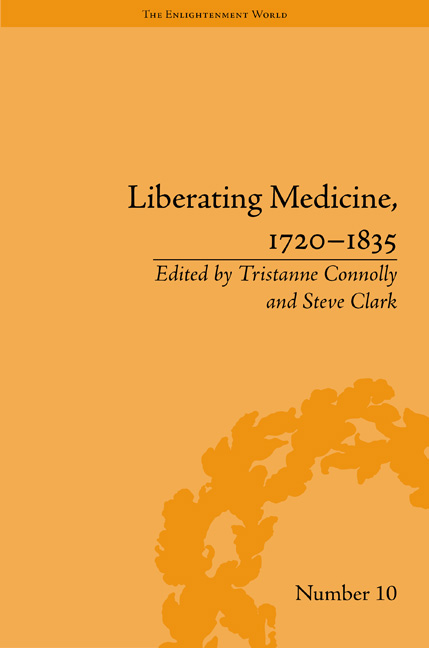Book contents
- Frontmatter
- CONTENTS
- Acknowledgements
- Contributors
- List of Figures
- Introduction
- I Spiritual Sickness and Hypochondria
- II Health and Emancipation
- 4 Due Preparations: Defoe, Dr. Mead, and the Threat of Plague
- 5 An Organic Body Politic: Wollstonecraft's Historical and Moral view of the Origin and Progress of the French Revolution and John Brown's Idea of Health
- 6 Blake, Liberation and Medicine
- 7 Untying the Web of Urizen: William Blake, Nervous Medicine, and the Culture of Feeling
- III Madness
- IV Anatomized and Aestheticized Bodies
- V Birth
- Notes
- Works Cited
- Index
4 - Due Preparations: Defoe, Dr. Mead, and the Threat of Plague
from II - Health and Emancipation
- Frontmatter
- CONTENTS
- Acknowledgements
- Contributors
- List of Figures
- Introduction
- I Spiritual Sickness and Hypochondria
- II Health and Emancipation
- 4 Due Preparations: Defoe, Dr. Mead, and the Threat of Plague
- 5 An Organic Body Politic: Wollstonecraft's Historical and Moral view of the Origin and Progress of the French Revolution and John Brown's Idea of Health
- 6 Blake, Liberation and Medicine
- 7 Untying the Web of Urizen: William Blake, Nervous Medicine, and the Culture of Feeling
- III Madness
- IV Anatomized and Aestheticized Bodies
- V Birth
- Notes
- Works Cited
- Index
Summary
‘but after some Parly at a Distance…’
(Daniel Defoe, A Journal of the Plague Year)At the invitation of Robert Walpole and the Lord Justices, who ‘thought it necessary for the Publick Safety’, to address the threat of plague reaching across the Channel to England, Dr Richard Mead, the prestigious London physician, provided them with A Short Discourse Concerning Pestilential Contagion, and the Methods to be used to Prevent it (1720). Daniel Defoe, in response to Mead's publication and to The Quarantine Act of January 1721 which had adopted Mead's recommendations, published Due Preparations for the Plague in February 1722, and the much better-known A Journal of the Plague Year the following month. While a few writers have speculated in passing upon the different intentions and characters of these two Defoe works, there is no in-depth consideration of Defoe's design in publishing two quite dissimilar works on the same topic within a month, or of the particular authorial craft and strategy in each of these bold challenges to Dr Mead. Richard Mead, although a Nonconformist, like Defoe – and thus excluded from attending Oxford or Cambridge for his medical training – could claim on the title page of A Short Discourse to be Fellow of the College of Physicians and of the Royal Society, and was well known to have attended, among other notable patients, Queen Anne, Robert Walpole and Isaac Newton.
Mead, despite his reputation and influence, might still have felt sufficient pressure to respond in the eighth and subsequent editions of A Short Discourse (1722 onwards) to the sharp criticism of Defoe (especially in Due Preparations) and others who had vigorously objected to a clause in the Quarantine Act of 1721 based on Mead's medical recommendation to impose quarantine of whole towns once any of the citizens came down with infection. The act allowed for the King to establish a sanitary cordon of militia around such infected towns and cities, and any citizens, and even the soldiers themselves, who trespassed such lines were deemed ‘felons’ and subject to penalty of death, as was already occurring in France.
- Type
- Chapter
- Information
- Liberating Medicine, 1720–1835 , pp. 55 - 68Publisher: Pickering & ChattoFirst published in: 2014



